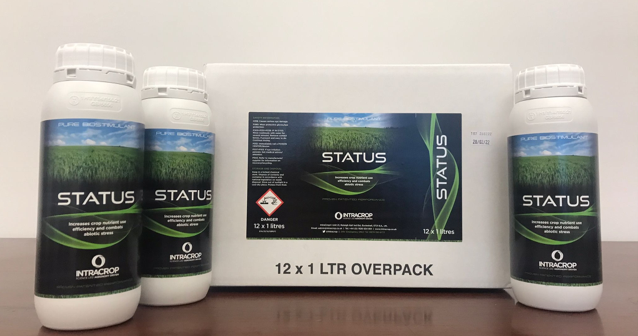IntraCrop, the speciality products division of Frontier Agriculture, has launched Status, a unique new plant biostimulant to help farmers improve nutrient use efficiency and combat abiotic stress in crops.
Status is the first in a line of plant biostimulants powered by the award-winning new phytohormone MTU (1-(2-methoxyethyl)-3-(1,2,3-thiadiazol-5yl) urea). MTU activates phytochrome, increasing red / far-red light absorption and boosting chlorophyll content in both photosystems (PS) I and II. It is believed to be the first biostimulant to have a direct effect on PSI. The increased photosynthetic capacity drives growth and protects the plant against abiotic stress conditions. It also improves plant resilience by stimulating the AHK3 cytokinin receptor to improve root growth.
IntraCrop has combined MTU with the complementary biostimulant pidolic acid to create Status. Pidolic acid is a signalling compound in the nitrogen assimilation cycle that improves nitrogen use efficiency and reduces toxic ammonia build-up during abiotic stress.
Game changer for farmers
Dr Mark Palmer, commercial director for IntraCrop, believes Status could be a game-changer for farmers seeking to protect crop potential during periods of stress. “The two biostimulants in Status work together to help plants cope with stress caused by drought, heat, salinity or even rapid growth,” he explains. “Whilst plant biostimulants cannot replace water, they can help protect the plant and reduce the impact of stress. When the stress is alleviated, the plants recover more quickly.”

Mark Palmer Intracrop commercial director
MTU was discovered by scientists at the Institute of Experimental Botany and Palacký University, Czechia in 2013. Lead scientist Dr Jaroslav Nisler screened over 3,000 molecules for phytohormone activity. MTU was selected as the most active in inhibiting chlorophyll degradation under stress. The mode of action and agronomic benefits were identified and published in leading scientific journals. In 2021 MTU won an award in the USDA/EPA Next-generation fertiliser challenge for nutrient use efficiency.
Further research has been conducted by several universities across Europe. In the UK glasshouse trials at the University of Nottingham have clearly shown the benefits of Status. The study compared growth under optimal and stressed conditions, with the plants put under repeated cycles of drought stress. Dr Palmer elaborates, “The results were impressive. Treated plants under drought stress had the highest root dry weight and actually weighed more than the non-stressed control plants.”
Subsequent small plot trials conducted over several years on a range of key crops and climatic conditions have confirmed the data. For the last two years, grower ‘tramline’ trials have taken place over larger areas to demonstrate field-scale performance.
Flexible treatment recommended
Dr Palmer recommends applying Status as a flexible spring treatment for Cereals. “In trials, we applied Status to a winter wheat crop at growth stage 30 just as dry spring conditions set in,” he says. “Yield from the treated plants was 0.37 t/ha higher than the untreated control. Similar results were achieved in trials in Poland and Germany under different climatic conditions.
“We have also seen exceptional results when Status is applied in sequence with a phosphite-based biostimulant,” he continues. “We evaluated the performance of Status after an application of Prosper Plus at different nitrogen levels. The results confirmed why Status helps plants recover from stress. We found higher nitrogen content in the treated plants, as well as significantly more chlorophyll in the leaves. This allows growth to continue, clearly demonstrating improved nutrient use efficiency.”




